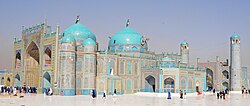Mausoleum of Imam Ali
Mosque and shrine in Afghanistan From Wikipedia, the free encyclopedia
Mosque and shrine in Afghanistan From Wikipedia, the free encyclopedia
The Mausoleum of Ali (Persian: مقام علی, romanized: Maqām ʿAlī) or Blue Mosque (مسجد کبود), located in Mazar-i-Sharif, Afghanistan, is a shrine purportedly housing the tomb of Caliph Ali, the first Imam of Shia Muslims (r. 656–661).
| Shrine of Ali | |
|---|---|
مقام علي | |
 The shrine as photographed in 2012 | |
| General information | |
| Type | Mausoleum |
| Location | Mazar, Afghanistan |
| Country | |
| Coordinates | 36°42′30″N 67°06′40″E |
| Named for | Ali (r. 656–661) |
| Completed | c. 10th–16th century CE |
| Known for | Purported resting place of the Rashidun caliph |
Many pilgrims annually celebrate Nowruz at the site. At the annual Jahenda Bala ceremony a flag is raised in honour of Alī. People touch the flag for supposed luck in the New Year.[1][2]
The earliest surviving source stating Ali to be buried in Balkh is Tuhfat al-Albab of the Andalusian traveller Abu Hamid al-Gharnati (d. 1170).[3] Abd al-Ghafur Lari wrote that Muhammad al-Baqir, the fifth Shia imam, assigned Abu Muslim the task of transferring Ali's body to the Khurasan, though this is likely apocryphal.[4]
The first structure of the site dates back to the Seljuk era. It was built by Sultan Ahmad Sanjar in the 11th century. In the 13th century, the Mongols under Genghis Khan invaded Balkh, where they massacred the Balkhi population and destroyed their places of worship. The mosque built by Sanjar was destroyed by the Mongols in the year 1220.[5]
In the 15th century, the Timurid amir, Sultan Husayn Bayqara, ordered a reconstruction of the destroyed building.[6]
In later years, various rulers made repairs and endowments, including the Shaybanid emir Abd al-Mu'min ibn Abd Allah Khan, who built a dome. Later, Berdi Beg, the Khan of the Golden Horde who reigned from 1357 to 1359, added several decorations to the building. In the modern era, a plan was created to renovate the whole complex in 1910.[7]
Seamless Wikipedia browsing. On steroids.
Every time you click a link to Wikipedia, Wiktionary or Wikiquote in your browser's search results, it will show the modern Wikiwand interface.
Wikiwand extension is a five stars, simple, with minimum permission required to keep your browsing private, safe and transparent.